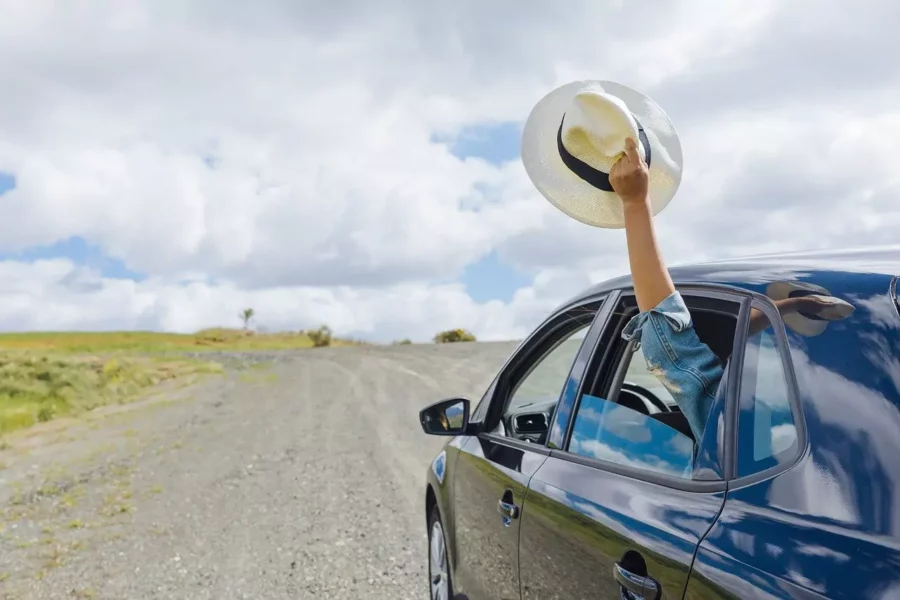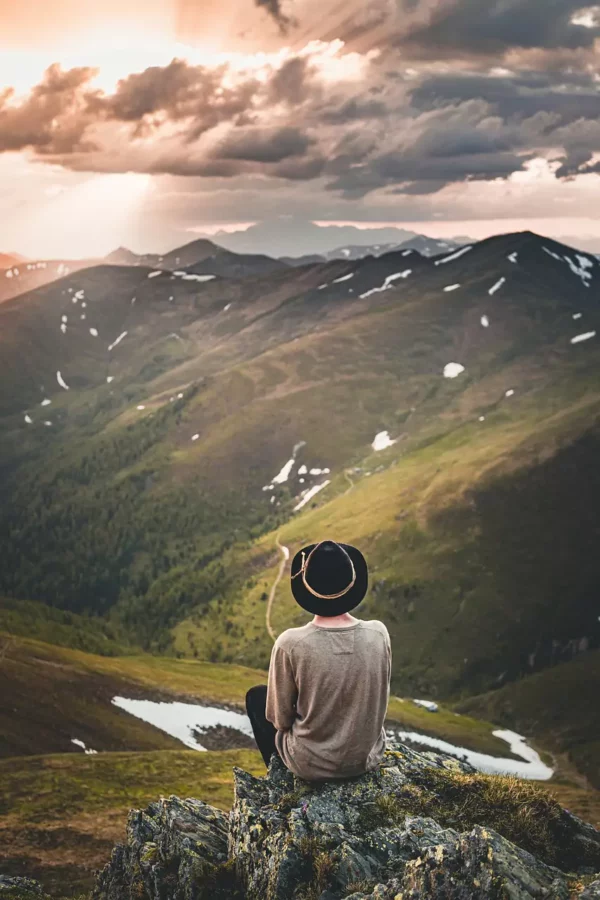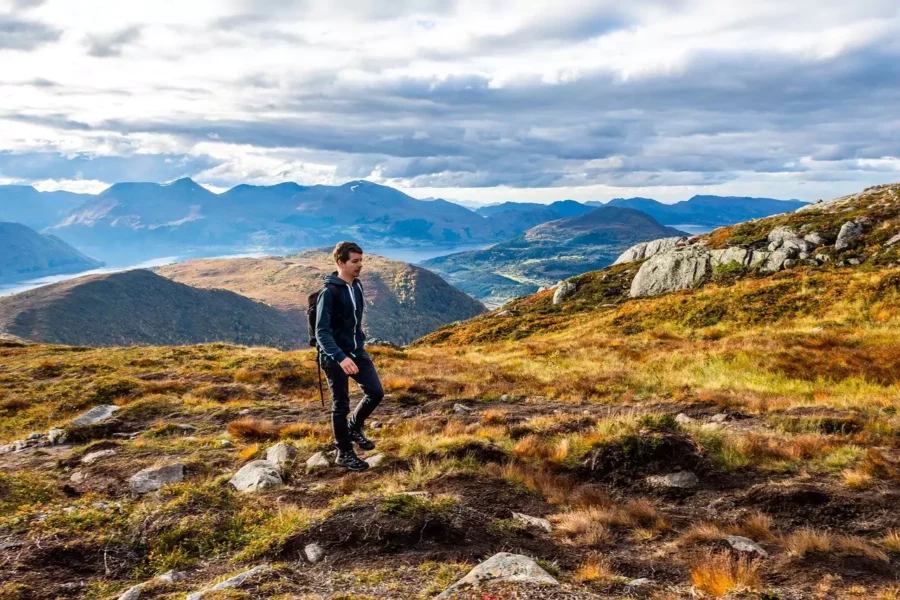What Is a Hodophile? Meaning and Characteristics
Hodophiles *love* to travel. Learn more about why it’s so important to them and what kind of benefits it can have.

A hodophile is a person who loves traveling, adventures, and journeys. The term comes from the Greek words “hodo” (journey) and philia (love or attachment). Hodophiles love nothing more than embarking on new expeditions, whether traversing rugged landscapes, exploring bustling cities, or immersing themselves in the tranquility of remote destinations.
This passion for travel stems from a natural curiosity to learn more about the world. For someone who is a hodophile, there is joy in the journey, the spontaneity, and the anticipation of what’s to come. Not only that, but there is also a thrill in the memories made during these travels.
Common Hodophile Characteristics
Hodophiles have a number of distinct characteristics that set them apart from people who don’t have the same love for travel.
- Curiosity and flexibility: Hodophiles are naturally curious and open to new experiences. They enjoy exploring because it satisfies their desire to learn and adapt to different situations.
- Adventurousness: One of the defining traits of hodophiles is their adventurous spirit. They thrive on adrenaline-inducing activities, whether hiking through rugged terrain, bungee jumping off cliffs, or skydiving over picturesque landscapes. Hodophiles are always on the lookout for new challenges and opportunities for excitement.
- Thrill-seeking and resilient: Hodophiles are adventurous and resilient. They’re not afraid to try new things and can easily handle unexpected challenges.
- Love for nature and culture: Many hodophiles feel a strong connection to nature and are fascinated by different cultures. They seek out environments rich in natural beauty and enjoy learning about the customs and traditions of new places.
- A desire for exploration and independence: At their core, hodophiles have a strong urge to explore and discover. They value their independence and enjoy the freedom of shaping their own travel experiences.
These characteristics highlight the simple yet powerful reasons why hodophiles love to travel and explore the world around them.
What Are the Benefits of Being a Hodophile?
Being a hodophile isn’t just a fun way to spend your leisure time–it’s a passion that can have very real benefits. Some of the positive ways that being a hodophile might affect your life include:

It Will Widen Your Perspective
Hodophiles gain a deeper understanding of the world through exposure to diverse cultures, traditions, and ways of life. This broadens their perspectives, fostering empathy, tolerance, and appreciation for the richness of human diversity.
You’ll Learn More About Yourself
Traveling pushes hodophiles out of their comfort zones, encouraging personal growth and self-discovery. Facing new challenges and experiences cultivates resilience, adaptability, and confidence, empowering hodophiles to overcome obstacles and realize their full potential.
It Fosters Greater Creativity and Better Problem-Solving
Navigating unfamiliar environments and situations stimulates hodophiles’ creativity and problem-solving abilities. Adapting to new circumstances requires thinking outside the box and finding innovative solutions, fostering a flexible and resourceful mindset that can be applied to various aspects of life.
Traveling Lowers Stress and Boosts Well-Being
Traveling offers hodophiles an escape from the stresses of daily life, providing opportunities for relaxation, rejuvenation, and mental clarity. Immersing oneself in nature, exploring new surroundings, and engaging in leisure activities can reduce anxiety, improve mood, and promote overall well-being.
You’ll Learn More About Diverse Cultures
Hodophiles forge meaningful connections with people from different backgrounds, fostering friendships and cultural exchanges that transcend borders. These interactions deepen hodophiles’ appreciation for cultural diversity and promote mutual understanding, tolerance, and respect.
You’ll Have Memorable Experiences and Gain Lifelong Memories
Traveling creates lasting memories and experiences that enrich hodophiles’ lives for years to come. From awe-inspiring natural wonders to unforgettable encounters with locals, each journey leaves an indelible mark, serving as a source of inspiration, joy, and nostalgia.
Traveling Is Exciting
Hodophiles thrive on the thrill of adventure and the excitement of exploring new destinations. The anticipation of discovering hidden gems, trying exotic cuisines, and embarking on spontaneous adventures fuels their passion for travel, making each trip an exhilarating and unforgettable experience.
Why Do People Become Hodophiles?
People become hodophiles for a variety of reasons, often stemming from a combination of intrinsic motivations and external influences:

- Curiosity: Many hodophiles are naturally curious individuals with an insatiable thirst for exploration and discovery. They are drawn to the unknown, driven by a desire to satisfy their curiosity and expand their horizons.
- Thrill-seeking: Hodophiles are often motivated by a sense of adventure and a craving for excitement. They thrive on adrenaline-inducing activities and constantly seek new challenges and experiences that offer a sense of thrill and stimulation.
- Sense of adventure: For some, the allure of travel lies in its ability to break free from the monotony of daily life. Hodophiles see travel as an opportunity to escape routine, shake things up, and inject a sense of novelty and spontaneity into their lives.
- Passion for learning: Hodophiles are fascinated by different cultures, traditions, and ways of life. They see travel as a means of cultural exploration and learning, relishing the opportunity to immerse themselves in unfamiliar environments and engage with people from diverse backgrounds.
- Love of the outdoors: Many hodophiles feel a deep connection to nature and are drawn to destinations known for their natural beauty and outdoor recreational opportunities. They seek out experiences that allow them to reconnect with the natural world, whether it’s hiking through pristine wilderness, camping under the stars, or exploring scenic landscapes.
- Desire for personal growth and self-discovery: Traveling often serves as a catalyst for personal growth and self-discovery. Hodophiles view travel as a journey of self-exploration, where they can challenge themselves, push their boundaries, and gain valuable insights about themselves and the world around them.
- Sociability and meeting new people: Traveling offers hodophiles the opportunity to forge meaningful connections with people from all walks of life. Whether it’s bonding with fellow travelers, forming friendships with locals, or engaging in cultural exchanges, hodophiles value the social aspect of travel and the connections it fosters.
- Creativity: Hodophiles often find inspiration in their travels, drawing creative inspiration from new experiences, sights, and sounds. They see travel as a source of inspiration that fuels their creativity and enhances their perspective on art, culture, and life in general.
These reasons, among others, contribute to the development of hodophiles’ deep-seated love for travel and adventure, shaping their attitudes, behaviors, and motivations as they embark on journeys near and far.
The Mental Health Benefits of Being a Hodophile
Here are some ways that being a hodophile and traveling can positively impact mental health:

Stress Reduction
Traveling provides a break from the stresses of daily life, offering a chance to unwind, relax, and recharge. Immersing oneself in new environments and engaging in leisure activities can help reduce stress levels and promote feelings of relaxation and well-being.
Mindfulness and Presence
Traveling encourages mindfulness and living in the present moment. Being in new surroundings prompts hodophiles to pay closer attention to their surroundings, fostering a sense of presence and awareness that can alleviate anxiety and promote mental clarity.
Sense of Accomplishment
Exploring new destinations and conquering challenges while traveling can boost self-esteem and instill a sense of accomplishment. Overcoming obstacles, navigating unfamiliar environments, and successfully adapting to new circumstances can enhance feelings of confidence and resilience.
Cultural Enrichment and Connection
Engaging with different cultures, meeting new people, and experiencing unfamiliar customs can foster a sense of connection and belonging. Building meaningful relationships and sharing experiences with others while traveling can combat feelings of loneliness and isolation, promoting social connectedness and emotional well-being.
Positive Mood and Emotional Resilience
Traveling often elicits feelings of excitement, wonder, and joy, which can elevate mood and enhance emotional resilience. Experiencing awe-inspiring natural landscapes, cultural landmarks, and unique attractions can evoke feelings of happiness and fulfillment, contributing to overall emotional well-being.
Cognitive Stimulation and Creativity
Exploring new environments and encountering novel experiences stimulates cognitive processes and promotes creativity. Engaging in activities such as problem-solving, navigating unfamiliar terrain, and learning about different cultures can sharpen cognitive skills and inspire creative thinking.
Perspective Shift and Growth
Traveling exposes hodophiles to different perspectives, worldviews, and ways of life, fostering personal growth and broadening horizons. Gaining insight into diverse cultures, traditions, and belief systems encourages empathy, tolerance, and open-mindedness, leading to greater emotional intelligence and perspective-taking abilities.
Sense of Freedom and Empowerment
Traveling offers hodophiles a sense of freedom and autonomy, empowering them to make choices and decisions that align with their values and preferences. Experiencing new cultures, cuisines, and landscapes allows hodophiles to embrace their individuality and assert their agency, promoting a sense of empowerment and self-efficacy.
How to Become a Hodophile
If you are interested in traveling but not really sure where to begin, there are a number of things you can do to become more of a hodophile.
Becoming more of a hodophile involves cultivating a mindset and lifestyle that embraces travel, exploration, and adventure. Here are some steps individuals can take to nurture their inner hodophile:
Cultivate Curiosity
Foster a sense of curiosity about the world around you. Explore topics that pique your interest, read books about different cultures and destinations, and engage in activities that challenge your perspective and broaden your horizons.
Embrace Spontaneity
Be open to spontaneity and embrace the unexpected. Allow yourself to step outside of your comfort zone, say “yes” to new opportunities, and be willing to adapt your plans based on the opportunities that arise.
Plan Regular Adventures
Make travel a priority in your life by setting aside time and resources for regular adventures. Whether it’s a weekend getaway to a nearby city or a long-term backpacking trip across continents, prioritize travel experiences that align with your interests and passions.
Seek Out New Experiences
Make a conscious effort to seek out new experiences and try things you’ve never done before. Whether it’s trying exotic foods, learning a new language, or participating in cultural traditions, embrace the opportunity to step outside of your comfort zone and expand your horizons.
Connect with Like-Minded Individuals
Surround yourself with people who share your passion for travel and adventure. Seek out communities, clubs, or online forums where you can connect with like-minded individuals, share travel tips and stories, and find inspiration for your next adventure.
Prioritize Personal Growth
View travel as an opportunity for personal growth and self-discovery. Challenge yourself to step outside of your comfort zone, confront your fears, and push your boundaries in pursuit of new experiences and opportunities for learning and growth.
Live in the Moment
Practice mindfulness and presence while traveling by immersing yourself fully in the experience. Put away distractions, savor the sights, sounds, and smells of your surroundings, and be fully present in each moment, embracing the richness of the travel experience.
Stay Flexible and Adapt
Be adaptable and flexible in your approach to travel. Embrace the spontaneity of the journey, be open to unexpected detours and changes in plans, and approach challenges with resilience and a positive attitude.
By incorporating these practices into your life, you can nurture your inner hodophile and cultivate a deeper appreciation for travel, exploration, and adventure.
Ideas for Hodophiles Looking for Adventures
Hodophiles are often drawn to a wide range of travel adventures that cater to their sense of exploration and adventure. Here are some examples:

Backpacking Through Europe
Embark on a backpacking adventure across Europe, exploring iconic cities, picturesque countryside, and cultural landmarks along the way. Visit famous landmarks such as the Eiffel Tower in Paris and the Acropolis in Athens while also discovering hidden gems off the beaten path.
Hiking the Inca Trail to Machu Picchu
Experience the awe-inspiring beauty of the Peruvian Andes by hiking the famous Inca Trail to the ancient city of Machu Picchu. Trek through breathtaking landscapes, including high mountain passes, cloud forests, and Inca ruins, culminating in a sunrise view of the iconic Machu Picchu citadel.
Island Hopping in Southeast Asia
Explore the tropical paradise of Southeast Asia by embarking on an island-hopping adventure. Visit destinations like Thailand, Indonesia, and the Philippines, where you can snorkel in crystal-clear waters, relax on pristine beaches, and immerse yourself in vibrant local cultures.
Camino de Santiago Pilgrimage
Walk the historic Camino de Santiago pilgrimage route across Spain, following in the footsteps of countless pilgrims who have made the journey for centuries. Experience the camaraderie of fellow travelers, visit charming medieval towns and villages, and reflect on your journey at the iconic Santiago de Compostela cathedral.
Cross-Country Road Trip
Embark on a cross-country road trip to explore the diverse landscapes and cultures of your own country. Drive along scenic routes like the Pacific Coast Highway in California, Route 66 in the United States, or the Great Ocean Road in Australia, stopping at national parks, small towns, and roadside attractions along the way.
Volunteer Travel
Combine travel with meaningful volunteer work by participating in volunteer travel programs around the world. Whether it’s teaching English in remote villages, volunteering at wildlife conservation projects, or assisting with community development initiatives, volunteer travel offers hodophiles the opportunity to make a positive impact while exploring new destinations.
Cultural Immersion Experiences
Immerse yourself in the culture of a destination by participating in immersive experiences such as homestays, cooking classes, or cultural festivals. Engage with locals, learn about traditional customs and rituals, and gain a deeper understanding of the cultural heritage of the places you visit.
These are just a few examples of the diverse travel adventures that hodophiles might consider pursuing. Whether trekking through rugged landscapes, immersing yourself in vibrant cultures, or embarking on adrenaline-pumping adventures, the world is full of opportunities for hodophiles to satisfy their wanderlust and create unforgettable memories.
Related reading:
- What Is a Dendrophile?
- What Is a Hodophile?
- What Is an Anthophile?
- Big Five Personality Traits
- Positive Qualities in a Person
- 85 Unique Talents and Skills You Can Develop
Sources:
Kawakubo, A., & Oguchi, T. (2022). What promotes the happiness of vacationers? A focus on vacation experiences for Japanese people during winter vacation. Frontiers in Sports and Active Living, 4, 872084. https://doi.org/10.3389/fspor.2022.872084
Liao, C., Zuo, Y., Xu, S., Law, R., & Zhang, M. (2023). Dimensions of the health benefits of wellness tourism: A review. Frontiers in Psychology, 13, 1071578. https://doi.org/10.3389/fpsyg.2022.1071578
Syrek, C. J., de Bloom, J., & Lehr, D. (2021). Well recovered and more creative? A longitudinal study on the relationship between vacation and creativity. Frontiers in Psychology, 12, 784844. https://doi.org/10.3389/fpsyg.2021.784844





